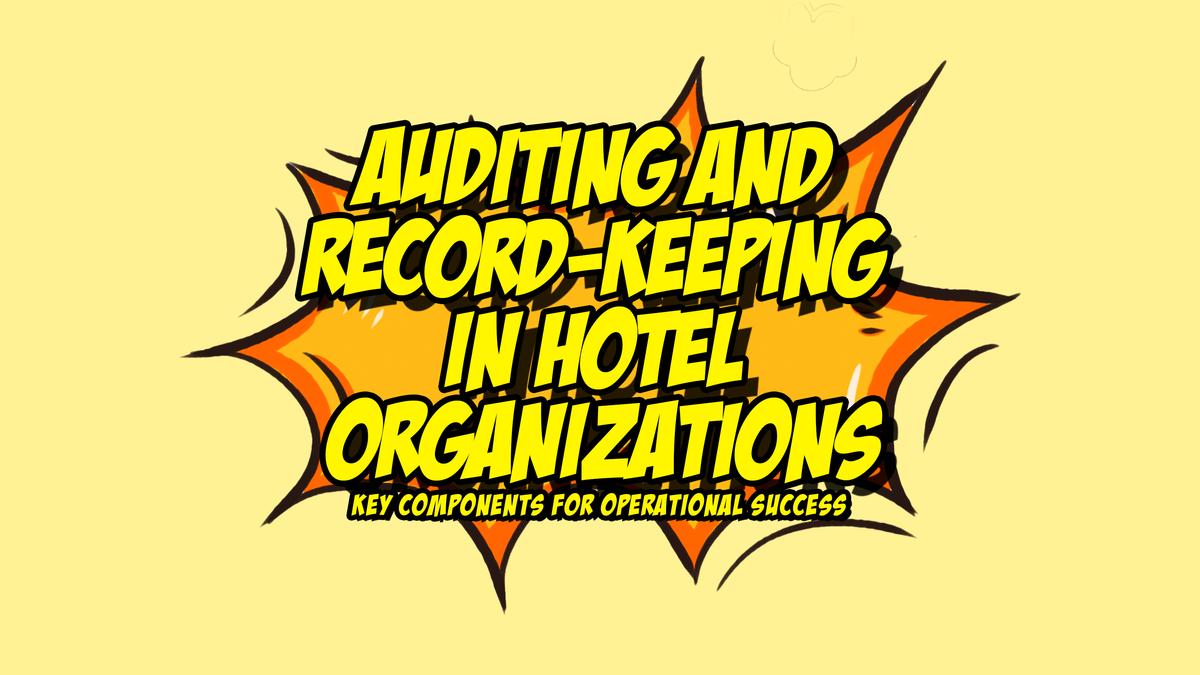In the hospitality industry, Auditing and Record-Keeping are critical components of a hotel’s operational framework. These processes ensure that all financial transactions, service quality standards, and operational practices are aligned with the hotel’s goals and legal requirements. Proper auditing and meticulous record-keeping not only help in maintaining financial transparency but also play a significant role in monitoring the hotel’s performance, optimizing resource use, and ensuring guest satisfaction.
Importance of Auditing in Hotel Management
Auditing refers to the systematic examination and evaluation of an organization’s financial and operational activities. In a hotel, the scope of auditing extends beyond mere financial scrutiny; it encompasses a comprehensive review of operational processes, employee performance, and service standards. Audits can be conducted internally by the hotel's management team or externally by third-party auditors.

Key Objectives of Hotel Audits
The key objectives of hotel audits are designed to ensure the financial health, legal compliance, and operational efficiency of a hotel, while also enhancing guest satisfaction. First, Financial Accuracy is critical to the success of any hotel. Audits ensure that revenue streams from room bookings, food and beverage sales, events, and other services are accurately recorded, helping the hotel maintain clear and transparent financial records. This is essential for budgeting, financial planning, and reporting to stakeholders.
Second, Compliance with Regulations is a fundamental part of hotel management. Hotels must adhere to various legal and regulatory requirements, including health and safety standards, labor laws, and tax obligations. Audits play a key role in verifying that the hotel is meeting these standards, ensuring that it avoids potential fines or legal issues.
Third, fraud prevention is an important function of audits. By regularly reviewing financial transactions, audits can detect inconsistencies or anomalies, helping to identify and prevent fraudulent activities that could harm the hotel’s finances or reputation.
Audits also improve operational efficiency by examining daily operations and identifying areas where resources are being wasted or where processes can be streamlined. Finally, guest experience is evaluated through audits, assessing whether the hotel is meeting its service standards. This can lead to improvements in guest satisfaction and loyalty, which are essential for long-term success.

Types of Audits in Hotels
Financial Audits
These Audits are conducted to ensure that the hotel’s financial records are accurate and comply with relevant accounting standards.
The audit includes reviewing income, expenses, assets, liabilities, and other financial activities.
Financial audits help in detecting discrepancies in financial statements, ensuring that the hotel's financial reporting is transparent and reliable.
Operational Audits
Focused on assessing the efficiency and effectiveness of the hotel’s day-to-day processes.
Includes evaluating key areas like housekeeping, maintenance, food and beverage services, and other operational aspects.
The goal is to identify areas for improvement, reduce operational costs, and maintain high service standards without compromising quality.
Compliance Audits
Ensure that the hotel is adhering to all applicable laws and regulations, such as safety standards, labor laws, and environmental regulations.
Auditors verify whether the hotel meets local, regional, and national compliance requirements, which are crucial for avoiding fines and legal liabilities.
Internal Audits
Conducted by the hotel’s management or an internal audit team to regularly assess the financial health and operational performance.
These audits provide ongoing oversight, enabling the hotel to identify issues and inefficiencies early and implement corrective measures.
External Audits
Performed by independent, third-party auditors to offer an unbiased evaluation of the hotel’s finances and operations.
External audits provide credibility to financial reports and ensure that the hotel complies with industry standards and regulations.
These audits are often required by stakeholders, such as investors or regulatory bodies, to maintain trust in the hotel's governance and management practices.
Record-Keeping in Hotel Management
Effective Record-Keeping forms the backbone of a well-managed hotel operation. It involves the systematic organization of important documents and data related to the hotel's operations, including financial transactions, guest information, inventory, and employee records. Proper record-keeping is crucial for audit preparedness, ensuring compliance with legal standards, and tracking the performance of the hotel.
Importance of Record-Keeping
Financial Transparency: Accurate records of revenue, expenses, and other financial activities ensure transparency in reporting. This is essential for budgeting, financial planning, and audit purposes.
Legal Compliance: In many jurisdictions, hotels are required to maintain certain records, such as employee payroll, tax documentation, and guest information. These records must be readily available in case of audits or legal inquiries.
Guest Information Management: Hotels need to maintain accurate records of guest bookings, preferences, and interactions. This data helps in providing personalized services and building customer loyalty.
Inventory Management: Detailed records of stock levels, usage rates, and procurement activities help the hotel manage its inventory efficiently, ensuring there are no shortages or overages.
Employee Records: Keeping track of employee attendance, performance evaluations, payroll, and other HR-related information ensures proper management of the workforce and helps in compliance with labor laws.

Key Records Kept in a Hotel
Financial Records
Income Statements: Records of revenue from room sales, food and beverage, events, and other services.
Balance Sheets: A snapshot of the hotel’s assets, liabilities, and equity at a given point in time.
Cash Flow Statements: Track the movement of cash in and out of the hotel, ensuring liquidity management.

Guest Records
Booking Information: Data on guest reservations, including dates, room preferences, payment methods, and special requests.
Service Logs: Records of services provided to guests, such as room service, spa treatments, or special amenities.
Feedback and Complaints: Documentation of guest feedback or complaints, which is useful for improving service quality.

Operational Records
Inventory Logs: Records of stock levels for food, beverages, linens, and cleaning supplies.
Maintenance Logs: Track repairs, equipment maintenance, and facility upgrades.
Housekeeping Schedules: Records of cleaning schedules and room turnover data.
Employee Records
Attendance and Payroll: Logs of employee working hours, payroll, and benefits.
Training and Development: Documentation of staff training, certifications, and professional development programs.
Performance Evaluations: Records of employee performance reviews and disciplinary actions.

Technology in Auditing and Record-Keeping
The rise of Technology has transformed how hotels handle auditing and record-keeping. Automated systems, such as Property Management Systems (PMS) and Enterprise Resource Planning (ERP) software, simplify these processes, making them more accurate and efficient.
Benefits of Technology in Auditing and Record-Keeping
Accuracy and Speed: Automated systems reduce human error and speed up the process of data entry, reconciliation, and report generation.
Real-Time Monitoring: Advanced systems allow managers to track financial performance, inventory levels, and guest data in real time, providing a clear picture of the hotel’s current status.
Data Security: Digital records are easier to secure, with encryption and backup systems ensuring that sensitive data is protected from unauthorized access or loss.
Audit Trail: Many modern systems automatically generate an audit trail, recording all changes and transactions, which makes it easier for both internal and external audits to be conducted efficiently.

Conclusion
Auditing and record-keeping are essential functions in a hotel organization that contribute to the smooth running of operations, financial transparency, and guest satisfaction. Through regular audits, hotel managers can identify areas for improvement, ensure legal compliance, and prevent fraud. Meanwhile, meticulous record-keeping provides the data needed for informed decision-making, efficient resource management, and the provision of personalized services to guests.
By leveraging modern technology, hotels can streamline these processes, ensuring that they operate at peak efficiency while maintaining the highest standards of service and operational transparency.



